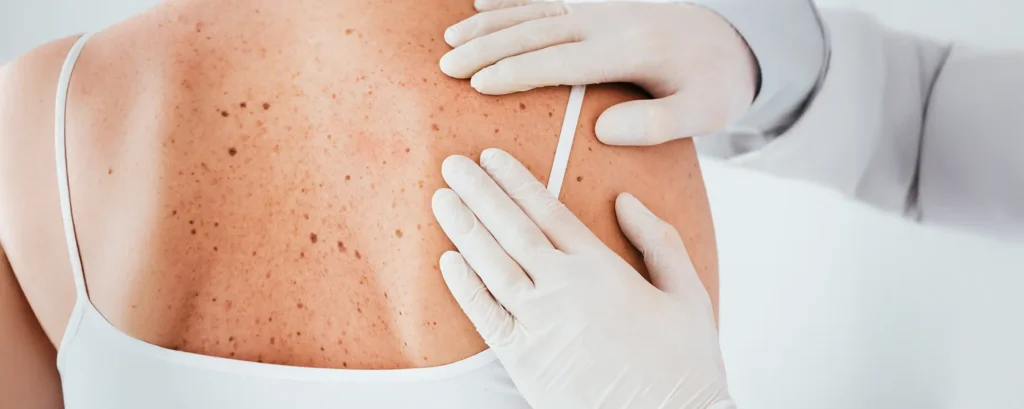When something unusual shows up on your skin be it a rash that won’t go away, persistent acne, dark spots, or a mole that’s started to change shape it’s natural to feel unsure about what to do next. Should you see your general practitioner (GP) first? Try an over-the-counter remedy? Book a facial with an aesthetician? Or is it time to consult a dermatologist directly?
With so many different professionals involved in skin care, it’s easy to get confused about where to begin. GPs can offer initial guidance and prescribe basic treatments. Aestheticians can help with cosmetic concerns and routine skin maintenance. But there are times when your skin issue needs the medical insight, diagnostic skill, and treatment options that only a consultant dermatologist can provide.
Knowing when to go straight to a dermatologist can make a significant difference not just in how quickly your problem is resolved, but in preventing potential complications down the line. In this article, we’ll break down the differences between these roles, explain the types of skin problems each is equipped to handle, and outline clear signs that it’s time to skip the guesswork and go straight to a skin specialist.
GPs: Your First Line of Defence
When you first notice a skin problem whether it’s a sudden rash, persistent itch, or a patch of dryness your general practitioner (GP) is often the best place to start. GPs serve as the front line of the healthcare system and are trained to diagnose and manage a wide range of physical and mental health conditions, including many skin-related concerns. While they may not have specialised dermatology training, their broad medical knowledge and experience mean they can still provide effective first-line support for various skin issues.
GPs are particularly helpful for common and mild-to-moderate skin problems. These might include:
- Mild eczema or psoriasis: They can help identify potential irritants or triggers, recommend suitable emollients or steroid creams, and offer guidance on how to manage flare-ups at home.
- Allergic skin reactions: Whether you’ve developed hives from a new skincare product or experienced swelling due to a food allergy, your GP can diagnose the likely cause and suggest antihistamines or topical treatments to ease symptoms.
- First-time acne breakouts: GPs are often the first point of contact for teenagers and adults experiencing acne for the first time. They can recommend appropriate skincare routines, prescribe topical retinoids or antibiotics, and assess whether hormonal imbalances could be contributing to the condition.
- Minor fungal or bacterial infections: Issues like athlete’s foot, ringworm, or impetigo can usually be diagnosed and treated effectively in a GP’s office with antifungal or antibacterial creams.
GPs can also provide initial assessments for more concerning skin symptoms, such as unusual moles, persistent lesions, or unexplained changes in skin texture. While they may not provide a definitive diagnosis, they play a crucial role in identifying red flags and referring you to a dermatologist or specialist clinic if needed. In this way, they act as valuable gatekeepers to more advanced care, ensuring that you receive timely support when necessary.
It’s important to understand that while GPs receive some dermatology training during medical school and in clinical practice, their expertise is general rather than specialised. They can offer guidance and treatments for straightforward skin conditions, but if the issue persists, worsens, or doesn’t respond to standard interventions, you may be referred to a consultant dermatologist for further evaluation.
That said, many skin issues do not require a specialist right away and a GP’s timely intervention can prevent conditions from escalating. Booking an appointment with your GP is often the most practical, accessible, and cost-effective first step when dealing with unfamiliar or uncomfortable skin symptoms.
Aestheticians: Skincare Support, Not Medical Treatment

Aestheticians sometimes referred to as skin therapists are professionals who specialise in the cosmetic care and maintenance of the skin. Their work focuses on improving the skin’s appearance, texture, and overall health through non-medical, surface-level treatments. You’ll typically find aestheticians working in salons, spas, beauty clinics, or dedicated skincare centres, offering a range of services designed to cleanse, nourish, and rejuvenate the skin.
People often visit aestheticians for a variety of skin-enhancing procedures, such as:
- Facials and exfoliation treatments: These are designed to deep-clean pores, remove dead skin cells, hydrate the skin, and give the complexion a refreshed, radiant look. Regular facials can help support healthy skin and improve the effectiveness of at-home skincare routines.
- Mild chemical peels: These involve the application of a mild acid solution to exfoliate the top layer of skin. The goal is to reduce dullness, improve skin texture, and address very mild pigmentation or fine lines.
- Non-medical acne support: Aestheticians can recommend products, perform extractions, and offer calming treatments that may help with mild, surface-level acne or occasional breakouts particularly when these are caused by clogged pores or poor skincare habits.
While aestheticians play a valuable role in routine skin maintenance and can certainly help you look and feel your best, it’s important to understand the limits of their expertise. They are not licensed to diagnose or treat medical skin conditions, and their services should never replace a consultation with a medical professional especially if you are experiencing more serious or persistent issues.
If you have symptoms such as chronic acne, eczema, psoriasis, rosacea, unusual moles, skin discolouration, or unexplained rashes, an aesthetician is not the appropriate person to assess your condition. These may indicate an underlying medical problem that requires diagnosis, prescription medication, or specialised intervention services only a GP or dermatologist can provide.
That said, aestheticians can be a wonderful complement to medical skin care, especially if you’re under the guidance of a dermatologist. For example, they can help maintain your skin between dermatology treatments, assist with hydration and barrier repair, and advise on product use that aligns with your doctor’s recommendations. Many dermatology clinics even employ licensed medical aestheticians to provide supportive services under clinical supervision.
In short, if your goal is to pamper your skin, support your skincare routine, or enjoy cosmetic treatments, aestheticians are an excellent resource. But for any condition that causes discomfort, pain, or long-term changes in your skin, seeking medical advice is essential.
Dermatologists: Skin Specialists
Dermatologists are highly trained medical doctors who specialise in the diagnosis, treatment, and prevention of diseases affecting the skin, hair, nails, and mucous membranes. Unlike general practitioners or aestheticians, dermatologists have undergone extensive, focused training in dermatology typically completing several additional years of study and clinical practice after medical school. Their expertise covers both common and complex skin conditions, ranging from cosmetic concerns to serious health issues.
It’s advisable to seek the care of a consultant dermatologist if:
- Your skin condition isn’t responding to GP treatment: If you’ve been using prescription creams or oral medications without any improvement or if symptoms keep recurring it’s a strong sign that your condition needs specialist input.
- You’ve noticed a new or rapidly changing mole: Any change in size, shape, colour, or texture of a mole, or the sudden appearance of a new lesion, could be a sign of skin cancer. Dermatologists are trained to identify suspicious growths and can carry out a skin biopsy if needed.
- You’re experiencing persistent, painful, or widespread rashes: Conditions like contact dermatitis, eczema, or autoimmune skin disorders often require precise diagnosis and advanced treatments that go beyond what a GP can offer.
- You’re dealing with severe acne or post-acne scarring: While mild acne can often be managed by a GP or aesthetician, moderate to severe acne may require oral antibiotics, hormonal treatments, or isotretinoin all of which can only be prescribed and monitored by a dermatologist.
- You suspect a long-term condition such as rosacea, vitiligo, or psoriasis: These are chronic conditions that require ongoing, tailored treatment plans, often involving both topical and systemic medications. Dermatologists can also recommend lifestyle adjustments, laser therapies, and prescription skincare products.
Dermatologists not only diagnose and manage medical skin issues they can also perform in-clinic procedures such as:
- Skin biopsies: A small tissue sample is taken to help confirm a diagnosis under a microscope, especially for suspected cancers, infections, or inflammatory skin diseases.
- Cryotherapy: Liquid nitrogen is used to freeze and remove benign or precancerous lesions like warts or actinic keratoses.
- Laser therapy and chemical peels: These may be used to treat pigmentation issues, broken capillaries, scarring, or sun damage.
- Minor surgical procedures: Dermatologists can excise cysts, skin tags, and suspicious moles safely and with minimal scarring.
Beyond treatment, dermatologists provide ongoing care for chronic skin diseases, helping patients manage flare-ups and prevent complications. Many also have subspecialties in cosmetic dermatology, allowing them to offer aesthetic treatments such as anti-wrinkle injections, dermal fillers, and advanced skin rejuvenation techniques.
Unlike aestheticians or GPs, dermatologists have a deep understanding of how skin disorders can affect overall health including the emotional toll of living with visible or uncomfortable skin conditions. Their role is not only to treat the skin but to help restore confidence and improve a person’s quality of life.
If you’re unsure whether your issue warrants a dermatologist’s attention, a good rule of thumb is this: if your skin concern is severe, persistent, unexplained, worsening, or emotionally distressing, it’s best to seek expert medical advice.
When to Skip the GP and Go Straight to a Dermatologist

While general practitioners (GPs) are often the first point of contact for medical concerns including those involving the skin there are certain situations where going directly to a dermatologist is not only appropriate but highly recommended. In these cases, consulting a skin specialist from the outset can lead to faster diagnoses, more effective treatment plans, and better long-term outcomes. This approach may also reduce the time spent on trial-and-error treatments that may not adequately address your issue.
Here are some clear scenarios where it’s best to bypass the GP and book an appointment with a dermatologist directly:
- Suspicious Moles or Lesions
Any mole or skin lesion that suddenly changes in size, shape, colour, or texture should be treated as a potential warning sign. Dermatologists are trained to identify and assess abnormal growths using dermoscopy and, if necessary, perform biopsies to rule out or confirm skin cancer. Delaying assessment in such cases could result in a missed diagnosis of conditions like melanoma, which require early intervention for the best prognosis. - Severe or Cystic Acne
If your acne is more than a few occasional breakouts especially if it’s painful, inflamed, or leaving behind scars you may need specialist care. Dermatologists can prescribe powerful treatments not available from GPs or over-the-counter, such as oral isotretinoin, hormone therapy, or customised combination regimens. They can also advise on scar prevention and offer clinical treatments like light therapy, chemical peels, or microneedling. - Unexplained Skin Changes
Some skin changes don’t respond to basic treatment or defy easy explanation. For example, sudden pigmentation changes, persistent itching, or rashes that don’t improve with common creams or antihistamines may signal an underlying condition that requires deeper investigation. A dermatologist can carry out a thorough skin assessment, take your medical history into account, and perform diagnostic tests if necessary to reach an accurate diagnosis. - Chronic or Recurrent Skin Conditions
Conditions such as psoriasis, eczema (atopic dermatitis), and rosacea are often long-term and can vary significantly in severity from person to person. While a GP may offer general advice or prescribe standard treatments, a dermatologist can tailor a management plan that suits your specific skin type, symptoms, and triggers. This might include phototherapy, immunosuppressive drugs, or biologic therapies for more severe cases. Seeing a dermatologist early in your condition’s course may help minimise flares and prevent complications.
In addition, people with a personal or family history of skin cancer, autoimmune skin disorders, or rare dermatological conditions should also consider seeing a dermatologist proactively for routine skin checks and expert advice.
While GPs are an essential part of your healthcare team, knowing when to seek specialist care is equally important. Dermatologists have the advanced training and tools to provide precise diagnoses, personalised treatment, and comprehensive skin health management, especially for more complex or serious concerns.
The Risks of Waiting Too Long
Delaying a proper diagnosis or timely treatment for a skin condition can lead to a host of avoidable complications. In some serious cases, such as melanoma or other forms of skin cancer, early detection and swift intervention can make the difference between a treatable condition and one that becomes life-threatening. Time is truly of the essence. Even with non-life-threatening concerns like acne, eczema, or rosacea, putting off care can result in long-term consequences. Persistent inflammation, repeated flare-ups, or the use of inappropriate over-the-counter products may worsen symptoms. In conditions like acne, this often leads to permanent scarring or pigmentation issues. For those dealing with eczema, untreated flare-ups can significantly disrupt sleep, concentration, and overall quality of life. What starts as a seemingly minor issue can quickly escalate into a chronic or more complex condition if not addressed early by the right specialist.
Getting a Diagnosis That Makes Sense
One of the key advantages of seeing a dermatologist is gaining access to an expert diagnosis that’s both clear and accurate. Skin conditions often have overlapping symptoms redness, itching, scaling, or bumps which can make them difficult to differentiate without specialised knowledge and tools. Dermatologists are trained to recognise subtle patterns and variations that may go unnoticed by non-specialists. To ensure accuracy, they may use diagnostic tools such as dermoscopy (a technique that magnifies and illuminates skin structures), skin scrapings for microscopic examination, patch testing for allergies, or even perform skin biopsies when necessary. These methods allow them to rule out serious conditions such as skin cancer, autoimmune disorders, or infections, and to identify the correct treatment path early. This not only speeds up recovery but also offers patients much-needed clarity and peace of mind. An accurate diagnosis is often the first and most important step toward effective treatment.
Specialist Treatments and Support
Dermatologists don’t just prescribe stronger versions of what your GP might offer. They also provide access to:
- Light therapies
- Cryotherapy
- Corticosteroid injections
- Laser treatments
- Advanced patch testing
This means faster relief and fewer flare-ups over time.
Final Thoughts: Take Control of Your Skin Health Consult a Dermatologist Today
If you’ve tried basic solutions and still have questions or concerns about your skin, don’t wait. You can get in touch with us to book a consultation with one of our expert dermatologists and take the first step toward clearer, healthier skin.
References:
- Johnson, M.T., Roberts, L.K. and Benson, C., 2017.
Diagnostic accuracy in dermatology: A comparison of general practitioners and dermatologists. British Journal of Dermatology, 177(2), pp.556–563.https://onlinelibrary.wiley.com/doi/full/10.1111/bjd.15489 - Chalmers, J.R., Thomas, K.S. and Griffiths, C.E.M., 2019.
Treatment approaches to eczema and implications of delayed care: A systematic review. Clinical and Experimental Dermatology, 44(4), pp.396–405.
https://onlinelibrary.wiley.com/doi/full/10.1111/ced.13896 - National Institute for Health and Care Excellence (NICE) (2021) Atopic eczema in under 12s: diagnosis and management. [Online] Available at: https://www.nice.org.uk/guidance/cg57
- National Institute for Health and Care Excellence (NICE), 2021.
Improving outcomes for people with skin conditions: A guide for primary care practitioners.
https://www.nice.org.uk/guidance/ng190/resources - Haile‑Redai, A. and O’Connor, J., 2021.
Diagnostic accuracy amongst Two Week Wait referrals for skin malignancy. Journal of Dermatology Research and Therapy, 7(2), pp.1–7.
https://clinmedjournals.org/articles/ijdrt/journal-of-dermatology-research-and-therapy-ijdrt-7-111.pdf
